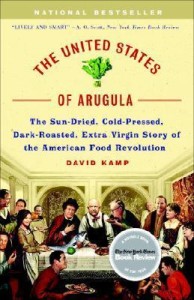Review: “The United States of Arugula” by David Kamp
by Jan

This book is a history of modern American cuisine from James Beard onwards right up to the current food trends.
What makes it so readable is the gossipy tone, eg. who slept with whom, and who teamed up and fell out with whom.
There’s also the satisfaction the reader gets from recognition of names and trends. Kamp writes about the transition from French Classical cuisine sold by fine dining restaurants, to a cuisine which is based on quality seasonal produce, treated simply. For example, Alice Waters spoke at the Sydney Opera House recently and said that a dessert she put on the Chez Panisse menu was a peach ripened naturally, served on a plate with a knife. She said the peaches were so beautiful that it would be difficult to improve them with cooking. The side effect of this is that customers can re-learn how wonderful these foods can taste if they haven’t sat in a warehouse for months.
It’s evident that Kamp is talking about chefs and restaurants high-end cuisine, and the usual retinue of food writers, not the latest type of take-away in the suburbs of Los Angeles or New York, which would be written about in Eric Schlosser’s Fast Food Nation.
These trends, of course, were picked up in Sydney in the early Eighties. The prime example was the Bayswater Brasserie. Other restaurants and hotels were still doing Classical French, sometimes badly.
I have recipe books of Julia Child, James Beard and the Time Life series. I loved them all because they provided good background for what I was taught at cookery school. But I loved Elizabeth David’s writing better because she dealt with markets, seasonality and treating French and Italian dishes simply. It didn’t matter if iceberg or rocket was in or out this year. This reminds me of a moment in the play called The Beast when one character was wondering aloud what happened to Iceberg and why. Food fads and their followers make themselves very easy to satirise.
It was the cuisine of Elizabeth David, then the next generation, Alice Waters and Wolfgang Puck, which was produced at the Bayswater Brasserie. Food looked natural on the plate, not a lot of tizzying and tweaking, not julienned, blow torched, or fiddled with by fifty fingers. Even though simply cooked and presented, it was also far from feed-lotted and franchised fast food.
This book would have been improved by looking at what ethnic immigrants were cooking because it is these cuisines which helped sophisticate American and Australian palettes – such as sushi, tacos, salsa, gyoza and Chinese dumplings. Not everyone can afford the fine dining establishments.